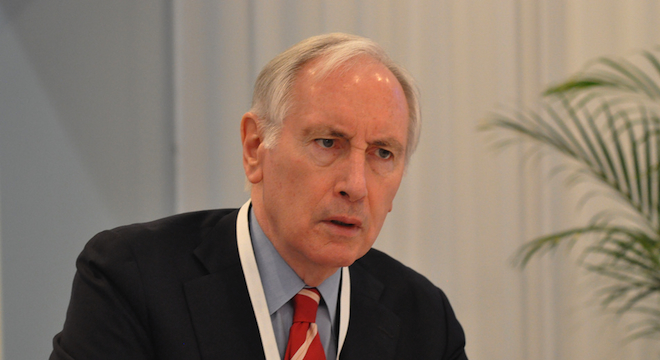The U.S. State Department will advocate on behalf of Internet freedom, and oppose proposed plans by other nations to control the flow of content or turn more control of Internet technology standards to the United Nations at an upcoming U.N. conference, U.S. ambassador Philip Verveer, told TPM in a phone interview.
“We recognize that this is a very important conference,” Verveer told TPM, referring to the World Conference on International Telecommunications (WCIT), a summit to be held in Dubai in December that will involve all 193 member nations of the United Nations with the aim of revising global telecom regulations, last agreed to in a 1988 treaty, well before the full commercialization and adoption of the Internet.
“We’re obviously particularly averse to seeing anything significant about [Internet] content being included,” in the updates to the 1988 regulations, Verveer explained.
More specifically, Verveer said that the State Department would file its own proposals for updating the international telecommunications regulations on August 3.
The news of the State Department’s stance comes after members of the U.S. Congress and several prominent U.S. Web user advocacy groups raised concerns about proposals introduced ahead of the conference by Russia, China, Iran and some Arabic nations.
Some of the proposals by these nations seemed to advocate for either imposing international metering fees on Internet traffic, patrolling Web content for spam and malware, and introducing new definitions of spam, malware and cyber crime.
U.S. members of Congress and advocacy groups are worried that these changes, if agreed to by a majority of the nations at the WCIT conference, could lead to tighter control of the Internet by other national governments, legitimized by the U.N. body that is in charge of the conference, the International Telecommunications Union (ITU).
As it turns out, the State Department shares some of these concerns.
“We don’t want to see, by any means, advertent or inadvertent outcomes to impair the Internet as we’ve come to know it, and the freedom of expression and flow of information,” Verveer said.
Further, the State Department said that the questions raised by lawmakers and advocacy groups about the proposals and the WCIT-12 conference itself are “entirely congruent” with the State Department’s own approach going into the conference.
“We’re completely aligned with elected officials,” Verveer told TPM. “It’s quite understandable why there are anxieties about this.”
That stance would seem to contradict some critiques, including a notable one in the New York Times, that such concerns about the WCIT conference are alarmist, overblown or overhyped.
Verveer confirmed that the State Department had received a letter sent by 20 Republican Congressmen to Secretary of State Hillary Clinton on July 18, requesting that the U.S. delegation to the Dubai conference either oppose the measures outright or join with other “freedom-loving countries” in calling for the conference to be canceled altogether.
By the same token, Verveer said the outcome of this particular conference is unlikely to be one that will substantially negatively impact the functioning of the Internet, as it designed mainly to address the physical mechanisms of data transmission, such as telecom cables and switches, also known as the “physical stack.”
“It’s almost certainly the case that the ITRs [international telecommunications regulations] will continue to be about the physical stack,” Verveer told TPM. “I don’t think that you are likely to see outcomes addressing the Internet in any encompassing sense.”
Asked how the State Department could simultaneously take seriously the concerns of lawmakers and advocacy groups while also being confident that those concerns wouldn’t be realized, Verveer said he didn’t see “any great tension,” in holding both views.
“Some people will look at set of facts and say some pretty unpleasant outcomes are possible,” Verveer explained. “We’re more disposed to the prediction that its not likely those outcomes will eventuate.”
Verveer said that was partially because the U.S. State Department and its delegation to WCIT had begun preparing for the conference a year-and-a-half ago, and was ramping up its efforts, meeting with private sector Web companies and experts as well as representatives from other countries, including China and Russia, to discuss the proposals.
The WCIT conference generally tries not to hold a vote on the issues it discusses, but rather reaches decisions by consensus, another factor which may stave off negative outcomes, as even a small subset of countries vocally opposed to certain proposals could stop them from going forward. Also, any compliance with the WCIT agreements remains entirely voluntary on the part of each member nation, so governments that don’t like the agreements reached don’t necessarily have to follow them.
That said, the State Department is keeping with ITU protocol in at least one sense: Verveer told TPM that the reason that it couldn’t publish all of the proposals for updating international telecommunications put forth by all 193 member nations on its website for anyone to read is “out of respect for other members of the ITU,” and the organization itself.
Critics have complained that the ITU, which says it is “committed to connecting the world,” itself doesn’t make the documents public, restricting access to delegates and other members participating in the WCIT conference. Some advocates have even begun leaking the documents on a website titled WCITLeaks.org.
The ITU has repeatedly said that it won’t try to stop any nations from distributing the documents as they see fit, and even published one main document of all the working proposals on its website, but neither the ITU, nor the U.S. government, has actually made all of the individual documents publicly accessible to all web users. Instead, Verveer said that the State Department was happy to provide the documents by request.
“If there are participants that want to get access, we’re certainly prepared to make documents available,” Verveer told TPM.






